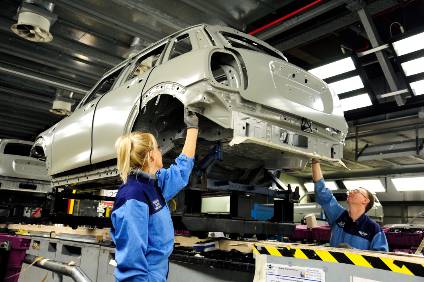
UK car production in August was up 3.3% on the same month last year, according to figures released by the Society of Motor Manufacturers and Traders (SMMT). This was the first increase in 15 months due mainly to the fact that several key plants that had brought forward planned summer shutdowns to April to guard against the disruption of the then March 29 withdrawal date kept production lines rolling throughout August.
However, the SMMT said that the August gain – 2,903 more cars were produced in August 2019 than in the same month last year – was not enough to compensate for April’s 56,999 units loss, resulting in a 17% deficit over last year in the year to date. Some 866,918 cars were produced in the first eight months of the year – the first time output has dipped below one million units in the period since 2014, and the biggest year on year decline since 2011.

Discover B2B Marketing That Performs
Combine business intelligence and editorial excellence to reach engaged professionals across 36 leading media platforms.
In August, production for the domestic market was up 15.2% following a significant fall in the same month in 2018 when several factors, notably preparation for new EU-wide testing regulations, affected volumes. Exports, meanwhile, registered 0.6% growth which the SMMT said disguises ongoing weakness in major global markets with production for China down two fifths (-43.8%), exports to the US falling 9.1% and those to the EU down 13.7% in the first eight months. However, exports still account for eight out of every 10 cars built in Britain – with the EU taking more than half (55.4%).
The news comes in the week that industry representatives from 17 of the EU’s biggest car producing and buying countries, including Germany, Italy, France, Belgium and Spain, as well as Turkey, with which the UK enjoys beneficial trading terms thanks to the EU, joined forces in united opposition to a ‘no deal’ Brexit.
Mike Hawes, SMMT Chief Executive, said: “While growth is always welcome, today’s figures mask the underlying downward trend and strengthening global headwinds facing the sector, including international trade tensions, massive technological upheaval and, in the UK, political and economic uncertainty. Softening of global demand is compounding the challenge to UK manufacturers for whom a ‘no deal’ Brexit would be a hammer blow. The mere threat of no deal has undermined investment and the potential imposition of tariffs, border delays and additional administrative burdens would damage competitiveness. We now need parliament and government to redouble efforts to get a deal that maintains free and frictionless trade. Given the ongoing challenges and costs being incurred, there is not a moment to lose.”
Stuart Apperley, director and head of UK automotive at Lloyds Bank Commercial Banking, said: “The current climate means any increase in production will be welcomed by the industry, but once the dust settles it will become clear if this is just a temporary rise driven by September’s new registrations changeover.
“Electric vehicle sales rising to their highest level in August, buoyed by the launch of a range of new models, gives some reason for optimism. But the looming deadline to comply with the Real Driving Emissions tests, the latest phase of legislation that caused significant supply disruption through the WLTP last year, provided further headaches.
“The industry is becoming increasingly vocal about the potential impact the UK leaving the EU without a deal might have on them. It will hope that by this time next month greater clarity has emerged.”






